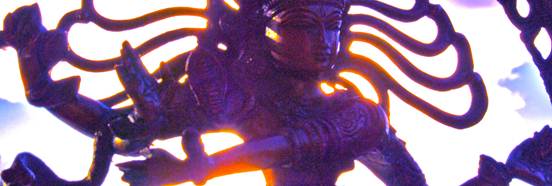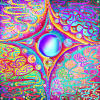
Shiva Sutras 3.20, 3.21, 3.22 & 3.23 – Turya State
Shiva Sutra 3.20
Trisu caturtham tailavadasecyam
There are four states In Kashmir Shavism: the waking state
(jagrat), the dreaming state
(svapna), the state of deep sleep
(susupti), and a fourth state called
TURYA which is “filled with pure knowledge, pure light, and the ecstasy and joy
of turya. … The state of
turya is found in all these three at
the moment of entry and at the moment of exit. [SLJ]”
Yet most people are absolutely unaware of turya. Jaideva
Singh defines turya as the witnessing
consciousness and the transcendental Self.
Swami Lakshmanjoo comprehensively explains
turya in Chapter Sixteen of his book on Kashmir Shaivism. “Between the three
states of the individual subjective body, waking, dreaming, and deep sleep,
there is a gap.” When you pass from one state to another, from waking to
dreaming or from dreaming to dreamless deep sleep, you enter into this
‘juncture’ called turya.
Perhaps one approach to glimpse the understanding
turya is an experience I believe most
aware self-reflective people are familiar with. In those subtle very elusive and
quickly vanishing moments when we are first coming up out of deep sleep or even
the dreaming state, many may feel that we have been given some insight or
inspiration. Often this is very helpful and offers the resolution to an
important problem or even practical advice. It is as if we are receiving
guidance from our soul deep within or the inspiration for a creative endeavor.
Turya
“cannot be experienced by focusing on it because whenever
you gaze on this junction, waiting for it to happen, it will never happen.
[SLJ]” So turya is elusive and yet is
said to be “already found in the states of waking, dreaming, and deep sleep.”
The three states are compared to swords and the fourth
turya state is their sheath and thus “they are united with each other.
[SLJ]” Turya is united with the other
three states even though we are not aware of this fact.
In this sutra the imagery of pouring oil is used to
illustrate that the state of turya,
the ‘witnessing consciousness’ of the God-within, must be ‘sprinkled’ onto the
other three states so that they “may acquire the condition of complete
identification with it (i.e. turya).
[Jaideva Singh]”
Just as oil spreads on a smooth “surface, adhering to it,
so in this way a yogi must expand the state of
turya into the other three states.
[SLJ]” Kashmir Shaivism teaches that our awareness of God consciousness will
eventually permeate not only our waking state, but also the dream and dreamless
deep sleep states.
Shiva Sutra 3.21
Magnah
svacittena praviset
How do we achieve permeating these three states with the
fourth - turya? Swami Lakshmanjoo
says that we must become merged in the Being of the Oneness. “When you have
developed I-ness on the body of wakefulness (the gross body), on the body of
dreaming (prana – vital air, life
breath), and on the body of deep sleep (the subtle spirit body – puryastaka),
then that ‘I’ consciousness is to be merged in the nectar of the ecstasy of
consciousness. [SLJ]”
This type of means for achieving God consciousness is
shaktopaya, which is based in
knowledge, a firm awareness, and does not involve saying mantras or breathing
exercises.
Jaideva Singh: “By means of this (shaktopaya),
one takes the plunge into the 4th State (turya)
by silencing the mind, by detaching oneself from the body,
prana, etc, by sheer awareness of the
pure I-consciousness (the Oneness). The aspirant enters the secret chamber of
transcendental consciousness with a spontaneous immediacy of feeling as the baby
slips into its mother’s arms.”
Our sense organs, the five senses and the mind, control our every impulse in
each moment. If we observe this phenomenon, we can detach our consciousness from
the power our senses have to wrap us in self-created webs of delusion. The trick
is to observe how they operate on us through external objects. The mechanics of
the senses are a perpetual ‘sales’ job. They own us – we have to reverse that.
Jnanagarbha Stotra: “When in ordinary daily life one repels the actions of the
mind and shatters dependence on the senses, by which one is enslaved, causing
one to follow them according to their every wish, and instead diverts his senses
towards God consciousness, then by your (God’s) grace he instantly achieves that
supreme state of God consciousness, which floods him with the unparalleled
nectar of bliss (ananda). [SLJ]”
Here the suggestion is made that slipping into God consciousness can be
instantaneous and require no effort on our part at all. All distances between
our temporal selves and God consciousness are in fact illusory. Eventually we
come to know this.
Shiva Sutra 3.22
Pranasamacare samadarshanam
Swami Lakshmanjoo: “When his breath begins to slowly move out toward the
external state, then he also experiences the pervasion of God consciousness
there.”
The transcendent state of
turya is found to permeate the other
states of waking, dreaming, and deep sleep. All states are experienced as God
consciousness and the yogi feels that his breath is filled with a supreme
fragrance. He is “a king of yogis. He never loses his God consciousness… (which)
endures in each and every state of his life, whether it be waking, dreaming, or
deep sleep.”
Shiva Sutra 3.23
Madhye ‘varaprasavah
However, there are unfortunate yogis who cannot hold onto God consciousness in
the waking state, dreaming and deep sleep states. The cause of this is explained
in the Malinivijaya Tantra:
“Due to the impressions he has of what others think of him or expect from him
and of his wanting to help others…he is played…played by every aspect of daily
life. Therefore, the one who desires to achieve the highest being should not be
attached to these outer impressions. [SLJ translation]”
Jaideva Singh translates this quotation from the
Malinivijaya Tantra to read: “Even when one has obtained some impression of the
transcendental state, if one is not on the alert, then the
vinayakas induce him to transient
pleasures.”
Vinayakas are
defined as beings that create obstacles in spiritual progress by offering
temptations. These ‘transient pleasures’ may be tendencies which are the
consequence of spiritual pride.
Swami Lakshmanjoo elaborates in more detail the behavior
of the yogi who is attached to these outer impressions such as caring about what
others think of him or being in need of wanting to help them. He says that the
yogi may want “to satisfy them with boons (gifts), he may lose his temper and
become careless and uneven-minded, (thus) blocking his flow of God
consciousness…(and) he is played.” Therefore we should not become attached to
these impressions and the subtly deceptive
vinayakas that seduce us away from
the treasure of our God consciousness.

Perhaps Swami Lakshmanjoo did not want to cloud our thoughts with visions of
beings that tempt us away from God consciousness. We have understood that
everything is God consciousness - therefore even the ‘entities’ that distract us
and derail us from our Path are also God. The concealing binding energies and
obstacles that hold our consciousness in illusory states and drag us back into
delusion are also God and therefore produced by and within us. The ‘enemy’ is
us!
Swami Lakshmanjoo seems to be more intent on the practical consequences of these
impressions. Being attached to what others think of us, and the need to help
others are seen as seductive traps. If we are genuinely immersed in the Oneness,
there can be no feelings of insecurity that would leave us needy, vulnerable to
the judgments of others.
However, I believe that the “need to help others” is even more insidious and
subtle. All masters are helping others - and many are generous not only with
their time and wisdom, but also often heal the sick.
Swami Lakshmanjoo was financially independent and never
took money from his disciples. He taught freely to those who sought him in
Kashmir. He did not like to use his
siddhic powers and warned others of their dangers, but on occasion he did
heal sick people who came to him and often gave money to those who needed it.
So I don’t believe he is saying we should not help others. Rather I feel that he
is saying we should not ‘need’ to help others. In other words, helping others
should not be a factor of our own weakness - our need to shore up feelings of
insecurity and helplessness. Helping others must not be ego based. We help
others because do so is in harmony with our own God consciousness.
The idea of God’s absolute Free Will
svantantrya also becomes relevant
here. God is everyone waiting patiently within us always. Swami Lakshmanjoo is
quite clear in the teaching that God will wake up in each of us only when God is
ready to do so. In fact, the longing for God consciousness, the willingness to
seek wisdom and devote our lives to any practice is perceived as a ‘symptom’
that God has already bestowed Grace on an individual. Being drawn to a life of
devotion to wisdom and the Path Home are the effects, not the cause.
Therefore we must face the fact that no one really needs our help, because they
already have all the help they require – which is of course the God-within them!
Everything is already always in each of us! We help others because it is in
harmony with our own God consciousness – not because we need to feel needed.
There is a difference.
***
KASHMIR SHAIVISM, The Secret Supreme, Revealed by Swami Lakshmanjoo, edited by
John Hughes; Universal Shaiva Fellowship, 1985, 2003.

Swami Lakshmanjoo
|
|